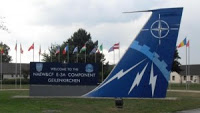Madison Ruppert, Contributing Writer
Activist Post
The global growth of the West and NATO is so complex and so far reaching that it is almost overwhelming.
However, I have been writing this series in an attempt to show my readers how many seemingly disconnected events are, in fact, highly connected and interrelated developments.
Without further ado, let’s jump right in and start examining some of the more important events which have transpired since the last part of this series.
Please do not forget to get yourself familiar with what is going on by reading parts one, two, and three. If I have missed anything I would appreciate you letting me know by emailing me directly at admin@endthelie.com.
Estonia
At a meeting with NATO Secretary General Anders Fogh Rasmussen, Estonian President Toomas Hendrik Ilves discussed continuing long-term NATO air operations in the Baltics, saying, “We have clearly stated repeatedly that the air security mission is not only unavoidable in a military sense, but it also represents a good example of smart defense and an expression of NATO’s internal [solidarity] with respect to its member states,” according to Estonian World Review.
Ilves said that Estonia is considering raising their monetary support of NATO and therefore would be “entitled to expect support from its allies.”
Yet the strongest statement coming from Ilves was when he said, “Baltic air space is also NATO’s air space; it is NATO’s task to defend this air space. This can only be done by the fighters of NATO members [sic] states located in the Baltic states.”
Given the region’s strategic location relative to Russia, this statement is quite interesting, to say the least.
It seems that the Estonian president is eager to give up his nation’s sovereignty in exchange for a spot in the vicious NATO alliance, something which I find quite worrisome for the people of Estonia and the greater Baltics as a whole.
He also said that a long-term air security solution should be adopted at the 2012 NATO summit in Chicago with the goal of “enhanced defense and deterrence capabilities of NATO.”
Ilves also said that they would need to maintain “the continued presence of the US armed forces in Europe, enhancing NATO’s cyber defense ambitions.”
Interestingly, it was also reported that they discussed the Afghan operation “and its possible development after the end of the mission’s military stage.”
Yet, as I have been repeatedly pointing out, there have been no indications that there is going to be an end of the mission’s military stage any time soon evidenced by the talks surrounding a long-term American-led presence in Afghanistan.
This fact fits into the picture perfectly because it serves as a strategic location relative to several nations including Pakistan, Iran and Russia.
During Rasmussen’s trip to Estonia, he praised the nation’s commitment to continue high levels of military spending in the face of an economic crisis and austerity.
 “I particularly value the Estonian government’s decision to increase its defense spending to 2 percent of GDP this year. This is a significant achievement, and a most welcome commitment. And it sets an excellent example,” he said.
“I particularly value the Estonian government’s decision to increase its defense spending to 2 percent of GDP this year. This is a significant achievement, and a most welcome commitment. And it sets an excellent example,” he said.
“You used the economic crisis as an opportunity to implement substantial defense reforms. By streamlining your military structures and making them more efficient, you were able to make substantial savings,” the Secretary General said.
“You have used these savings to invest in higher priorities – in operational needs and in more useable capabilities. And that is one important lesson for the Alliance more widely,” he added.
I find this type of logic to be nothing short of abhorrent and the fact that it is being employed to justify military spending in countries that cannot afford it is quite worrisome and should be a matter of concern for the people of Estonia.
We are facing a similar dilemma in the United States with the war profiteers parasitically eating our economy alive, along with the similarly corrupt and corporatist financial industry.
Lithuania
The Lithuanian Minister of National Defense, Rasa Jukneviciene, also met with NATO Secretary General Anders Fogh Rasmussen in a joint meeting with the Prime Minister, Andrius Kubilius.
During the meeting the two Lithuanian leaders and the top NATO official discussed “perspectives of the Baltic Air Policing mission, smart defense, the operation of the INternational Security Assistance Force [ISAF] in Afghanistan and join military training,” according to DefPro.
“Collective planning within NATO is of utmost importance to us, just like joint military training,” Jukneviciene said.
This is Rasmussen’s second visit since 2009 when he visited during the Baltic States’ 5th anniversary of NATO accession, something which I would argue is hardly worth celebrating.
Lithuania is an important ally in NATO’s global encirclement effort due to their strategic location relative to Russia.
Philippines
Reuters has reported that the United States and the Philippines will be engaging in joint military drills near the disputed area of the West Philippine Sea.
They rightly point out that these operations “may anger Beijing” as they are aimed at “testing their readiness to protect offshore oil and natural gas platforms,” not to mention the fact that the United States recently gave a naval vessel to the Philippines as well.
Lieutenant-General Juancho Sabban, the military commander on the Philippines’ western island of Palawan, stated that this would be the first time that an annual military exercise would focus primarily on protecting offshore energy platforms.
He claimed that the maneuvers should not irk China, although I think that is quite doubtful given that they indeed have claims to territory in the region.
To support this contention, I point to China repeatedly telling the United States that countries without a direct interest in the South China Sea dispute should stay out it, something which the United States has clearly ignored.
“Why should they [China] be angry, this is an annual activity,” he said, ignoring the fact that the United States is involved.
It appears that the exercise is mostly aimed at preparing to protect corporate interests which could possibly, in the future, come “under attack by terrorists,” according to Sabban.
This dovetails with the ship recently provided to the Philippines which is being used to patrol the same region which this exercise seems to be focused on.
 The drills are reportedly to be held near the Malampaya gas project which includes property owned by a division of Chevron, Chevron Malampaya LLC, along with a division of Royal Dutch Shell, Shell Philippines Exploration B.V.
The drills are reportedly to be held near the Malampaya gas project which includes property owned by a division of Chevron, Chevron Malampaya LLC, along with a division of Royal Dutch Shell, Shell Philippines Exploration B.V.
This cooperation between the United States and the Philippines is hardly new, with American Special Forces troops holding training sessions for Filipino troops since 2002.
This has been done under the guise of “fighting a group of al Qaeda-linked Islamist militants in the southern Philippines” and the classic humanitarian excuse as well.
But this history goes back even further, with joint military exercises being held under a security treaty signed in 1951.
Recently, four prominent American Senators traveled to the Philippines to meet with President Aquino to discuss the growing military cooperation.
John McCain, Joe Lieberman, Sheldon Whitehouse and Kelly Ayotte, all members of the Senate’s armed services committee, vowed to support the Philippines request to acquire a second Hamilton-class cutter according to The Philippine Star.
“The senators said that they are increasing their presence in the Asia-Pacific region. As you know, they already have established bases in Australia and Singapore. There will be increased military exercises in Asia-Pacific region and that would also include the Philippines,” said Edwin Lacierda, presidential spokesman, quoting the Defense Secretary Voltair Gazmin who was present at the meeting between the president and the American Senators.
Lacierda added that the Philippines is ready to participate in more military exercises with the United States saying, “We profit from the experiences of joint military exercises. It enhances our experience, it improves our capabilities. We learn from the Americans.”
Unfortunately, what they are learning is how to be militaristic, imperialistic and brutal; traits which are not conducive to a peaceful resolution of the South China Sea dispute.
Then again, it has become quite obvious that the West and NATO have no interest in peace. If they did, they would sign a pact with Russia dealing with the anti-ballistic missile shield program, and also take up the Russian offer to integrate their radar systems with the NATO system.
This approach to the South China Sea dispute was highlighted by McCain in saying that China should not be allowed to have “disproportionate control” over what they pointedly call the West Philippine Sea.
“If there is indeed a withdrawal of the US then I believe that that would mean a lessening of stability in the region,” McCain said, perfectly reflecting the nonsensical attitude held by so many warmongers who are in the pockets of the defense contractors.
Apparently, angering China by meddling in the dispute and increasing the stakes by heavily arming some nations creates more stability than if the United States dealt with the massive domestic problems instead and let these countries solve their own disputes as nations have done for centuries.
Currently, several countries claim the Spratly Islands in the South China Sea or the “West Philippine Sea” depending on what you read (and how biased the source is) but the typically agreed upon location is indeed the South China Sea, contrary to what you might read in Filipino publications.
Countries which claim the islands include China, the Philippines, Brunei, Malaysia, Vietnam and Taiwan, some of which have small numbers of military units in the region.
The Philippines is currently making a push to modernize their armed forces, with the United States providing a great deal of the equipment.
 “The secretary asked for assistance regarding military hardware, especially cutters,” the spokesman for the Filipino Department of National Defense (DND) Peter Galvez said, without giving further details.
“The secretary asked for assistance regarding military hardware, especially cutters,” the spokesman for the Filipino Department of National Defense (DND) Peter Galvez said, without giving further details.
The dangerous aspect of this partnership is that the United States is indeed planning on conducting military exercises in the region of the Spratly Islands themselves, something which would likely make China uncomfortable, and rightly so.
China has made it painfully clear that they want the United States and any country without direct involvement in the dispute to mind their own business. This hardly seems like an unreasonable request given that the United States really has no place in the dispute.
Except, of course, for the Western corporations which are operating in the area and given that the United States military more often than not serves corporate interests nowadays, it is only logical that the U.S. would insert itself into the equation despite the fact that it will only serve to make it more dangerous for everyone involved.
Poland
Since 2004 Polish pilots have been trained on bases belonging to the United States and recently the Chief of the General Staff of the Polish Armed Forces, General Mieczyslaw Cieniuch paid a visit to the 162nd Fighter Wing at the Tucson International Airport in Tucson, Arizona.
General Cieniuch is the highest ranking Polish military officer, and is the equivalent of General Martin Dempsey, the Chairman of the Joint Chiefs of Staff, thus the appearance was quite a meaningful one.
Army Maj. Gen. Andrzej Falkowski, the Polish Defense Attaché to Washington D.C., and Army Brig. Gen. Sławomir Wojciechowski, Polish Deputy Chief of Operational Planning.”
This visit came just days avert General Cieniuch visited Washington D.C. where he was given the Legion of Merit award by General Dempsey.
The award was conferred for General Cieniuch’s “leadership with the cooperation, understand and relationship between the armed forces of the United States and Poland.”
Like Lithuania and Estonia, Poland is an important strategic ally for NATO and the West, because Poland’s capital of Warsaw is less than 800 miles from the Russian capital, Moscow (which is also its most populous city in Russia and the entirety of Europe with over 11.5 million residents according to the 2010 Census).
Of course Poland is also a key player in the anti-ballistic missile system, which is rightfully angering the Russians and has led them to create their own advanced warning radar system.
Hopefully the people of these various countries will not allow themselves to be deceived into thinking they need to join the Western war machine.
The U.S.-NATO approach to conflict clearly does not work, evidenced by the constant war, suffering and death we see plaguing the globe.
Maybe if more people step back and take a look at the larger scheme that is playing out here we will be able to push back the tide of neo-imperialistic militarism.
If we do not, I can guarantee whatever comes out of it will not be pretty, to say the least.
This article first appeared at EndtheLie.com
linkwithin_text=’Related Articles:’



Be the first to comment on "U.S. and NATO are on the march worldwide – part IV"